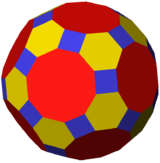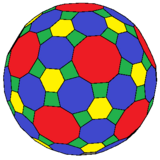Truncated rhombicosidodecahedron
| Truncated rhombicosidodecahedron | |
|---|---|
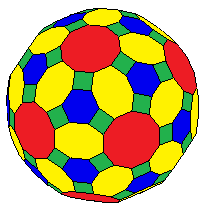
| |
| Schläfli symbol | trr{5,3} = [math]\displaystyle{ tr\begin{Bmatrix} 5 \\ 3 \end{Bmatrix} }[/math] |
| Conway notation | taD = baD |
| Faces | 122: 60 {4} 20 {6} 30 {8} 12 {10} |
| Edges | 360 |
| Vertices | 240 |
| Symmetry group | Ih, [5,3], (*532) order 120 |
| Rotation group | I, [5,3]+, (532), order 60 |
| Dual polyhedron | Disdyakis hexecontahedron
|
| Properties | convex |
In geometry, the truncated rhombicosidodecahedron is a polyhedron, constructed as a truncated rhombicosidodecahedron. It has 122 faces: 12 decagons, 30 octagons, 20 hexagons, and 60 squares.
Other names
- Truncated small rhombicosidodecahedron
- Beveled icosidodecahedron
Zonohedron
As a zonohedron, it can be constructed with all but 30 octagons as regular polygons. It is 2-uniform, with 2 sets of 120 vertices existing on two distances from its center.
This polyhedron represents the Minkowski sum of a truncated icosidodecahedron, and a rhombic triacontahedron.[1]
Related polyhedra
The truncated icosidodecahedron is similar, with all regular faces, and 4.6.10 vertex figure. Also see the truncated rhombirhombicosidodecahedron.
The truncated rhombicosidodecahedron can be seen in sequence of rectification and truncation operations from the icosidodecahedron. A further alternation step leads to the snub rhombicosidodecahedron.
| Name | Icosidodeca- hedron |
Rhomb- icosidodeca- hedron |
Truncated rhomb- icosidodeca- hedron |
Snub rhomb- icosidodeca- hedron |
|---|---|---|---|---|
| Coxeter | ID (rD) | rID (rrD) | trID (trrD) | srID (htrrD) |
| Conway | aD | aaD = eD | taaD = baD | saD |
| Image | 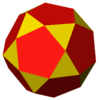
|
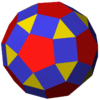
|
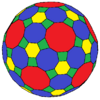
|

|
| Conway | jD | oD | maD | gaD |
| Dual | 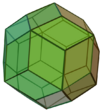
|

|
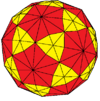
|
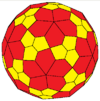
|
See also
References
- ↑ Eppstein (1996)
- Eppstein, David (1996). "Zonohedra and zonotopes". Mathematica in Education and Research 5 (4): 15–21. http://www.ics.uci.edu/~eppstein/junkyard/ukraine/ukraine.html.
- Coxeter Regular Polytopes, Third edition, (1973), Dover edition, ISBN 0-486-61480-8 (pp. 145–154 Chapter 8: Truncation)
- John H. Conway, Heidi Burgiel, Chaim Goodman-Strauss, The Symmetries of Things 2008, ISBN 978-1-56881-220-5
External links
- George Hart's Conway interpreter: generates polyhedra in VRML, taking Conway notation as input
 |
